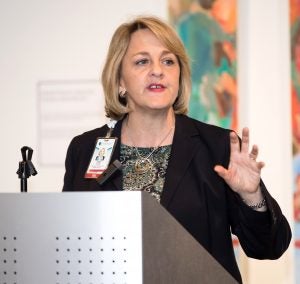College Hosts Big Data Symposium
East Carolina University’s College of Business hosted its ninth annual Big Data at Eastern North Carolina Symposium on Wednesday.
The event brought together students, industry representatives, faculty researchers, data collectors and number crunchers to discuss the latest uses and trends in big data and analytics.

Joan Wynn, Vidant Health chief quality and patient safety officer, discusses how her organization uses big data to give patients more control over their health services and treatments.
Big data refers to large sets of facts and statistics that can be analyzed to reveal patterns, trends and associations. This analysis can lead to newfound knowledge in human interactions and behaviors. Researchers use big data to solve problems and create efficiencies, like reducing readmission rates for hospital patients or determining hospital bed capacity.
Huigang Liang, a professor in ECU’s Department of Management Information Systems, said that big data is playing a key role in the university’s future research endeavors and ties in with its Rural Prosperity Initiative.
“Big data and analytics ties in very well to the Rural Prosperity Initiative,” Liang said. “We can use big data in the health care field to provide better care, drive down costs and measure risk; we can use big data in education to find barriers to student learning and provide solutions; and we can use big data to combat economic disparities by analyzing population data and observing business trends.
“Big data and analytics is a team discipline,” he said. “It’s something every field – from business, health care to psychology – can use. The important thing is that we learn the right ways to interpret data to find out what that data means and figure out where it can take us.”
Joining ECU’s students and faculty members at the symposium were representatives from software and health care leaders SAS Software, RTI International and Vidant Health. SAS Software’s presentation focused on using data to drive informed decision making, while RTI International displayed its online personal health toolkit. Vidant Health officials discussed using big data and analytics to drive and measure quality and safety in its hospitals and care centers.
Speakers tasked audience members to think about the type of data they collect for their research projects and what they intend to do with it.
“Data is useless without analysis,” SAS Software Senior Healthcare Solution Manager Rick Monaco said. “We have to use analytics to turn data into something. We have to know how to use data. Data gives us information, but by analyzing data and looking ahead at trends and associations, we can gain useful knowledge.”
Paul Carmichael, a student in ECU’s Business Analytics Certificate program, said having the opportunity to explore how other researchers are using big data has been beneficial.
“Seeing some of the other projects researchers are using big data for has been eye-opening,” he said. “I use big data analysis at my current job in the insurance field, so to see where big data could take us is useful.”
ECU has made strides in its efforts to make big data and analytics a focus in the classroom and faculty research projects. In 2017, the university launched the big data and analytics research cluster, which plans to develop university-wide data analytics capabilities and provide data visualization technologies. ECU is also exploring the possibility of adding a dig data postdoctoral program.
The university has announced partnerships with SAS and RTI to provide on-site data software training, teaching materials and mentorship opportunities to help rural areas overcome economic, educational and health disparities.
“Big data shouldn’t be a scary term; it’s just data that we’re all producing,” ECU professor Lucky Xue said. “What’s important is learning how to extract knowledge out of these data sets and applying that knowledge to enhance our daily lives.”